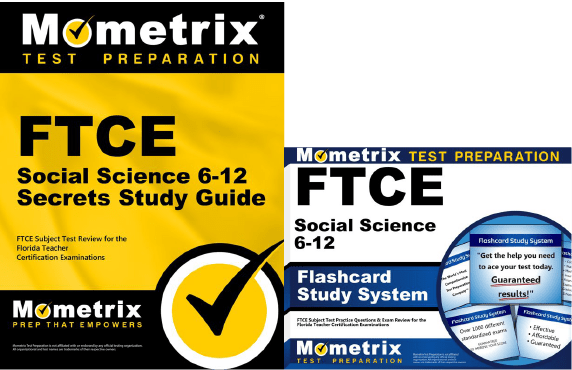If you need help studying for the FTCE Social Science 6-12 test or just want some more information about what the test is like, you’ve come to the right place!
Click below to take a free FTCE Social Science 6-12 practice test!
What’s on the Test?
The FTCE Social Science 6-12 test contains 80 multiple-choice questions and is timed at 2.5 hours.
The exam is split into six competencies:
1. Geography
10% of the exam
- The six essential elements of geography
- How Earth’s physical systems are shaped by natural processes and human-environment interactions
- How cultural features are shaped by natural processes and human-environment interactions
- Analyzing geographic information from maps and graphs
2. Economics
15% of the exam
- The influence of scarcity and opportunity costs on resource allocation
- The interaction of supply and demand in determining consumption, production, and distribution
- The influence of macroeconomic factors on economic systems
- The roles of government, specialized institutions, and central banking in market and command economies
- The features of global economics
- The functions of budgeting, saving, and credit in a consumer economy
3. Political Science
15% of the exam
- The features and principles of the US Constitution
- The functions of US political institutions
- The electoral process in the US
- The elements and functions of state and local US governments
- Concepts, principles, and effects of US foreign policy
- US citizenship
4. World History
25% of the exam
- Characteristics of prehistoric cultures and ancient civilizations
- The influence of ancient civilizations on modern civilization
- Major contributions of various societies and eras throughout history
- Causes, effects, events, and significant people within the Age of Exploration
- The Industrial Revolution
- The impact of imperialism and nationalism on global development
- Causes and effects of 20th century political transformations and military conflicts
- Major world religions and ideologies
5. US History
25% of the exam
- The impact of the Age of Exploration on the Americas
- Development of the Americas during the colonial period
- Causes, effects, and significant people within the Revolutionary and Constitutional eras
- The antebellum period
- The American Civil War and Reconstitution eras
- The impact of agrarianism, industrialization, urbanization, and reform movements on development in the late 19th and 20th centuries
- The impact of immigration in the late 19th and 20th centuries
- World War I and World War II
- Events associated with domestic and foreign affairs during the Cold War
- Events associated with movements for equality, civil rights, and civil liberties in the 19th and 20th centuries
- Contemporary domestic and foreign affairs
- Significant people, events, and issues in Florida history
6. Social Science and Its Methodology
10% of the exam
- Identifying social science disciplines and concepts
- Interrelationships between social science disciplines
- Interpreting tabular and graphic representations of social science information
- Strategies and technologies for teaching social science
- Primary and secondary sources
How to Register
To get started with the registration process, you’ll need to create an FTCE/FELE account on their website. You can then register for the exam via your account.
How the Exam is Scored
The FTCE Social Science 6-12 test is scored using a scaled scoring method. Here’s how it works:
For every question you answer correctly, you get one point added to your raw score. At the end of the test, your final raw score will be converted to a scaled score.
The reason your raw score is converted to a scaled score is because everyone that takes the test is given a slightly different set of questions. Since everyone has a different arrangement of questions, and because some questions are harder than others, converting your raw score to a scaled score ensures a more even playing field.
FAQs
How many questions are on the FTCE Social Science 6-12 exam?
The exam contains 80 questions.
What is the time limit for the FTCE Social Science 6-12 exam?
The exam is timed at 2.5 hours.
What is the passing score for the FTCE Social Science 6-12 exam?
You’ll need to get a final scaled score of at least 200 to pass.
How much does the FTCE Social Science 6-12 exam cost?
The testing fee is $150.
Mometrix Test Preparation is not affiliated with or endorsed by any official testing organization. All organizational and test names are trademarks of their respective owners.



 FTCE Study Guide
FTCE Study Guide FTCE Flashcards
FTCE Flashcards